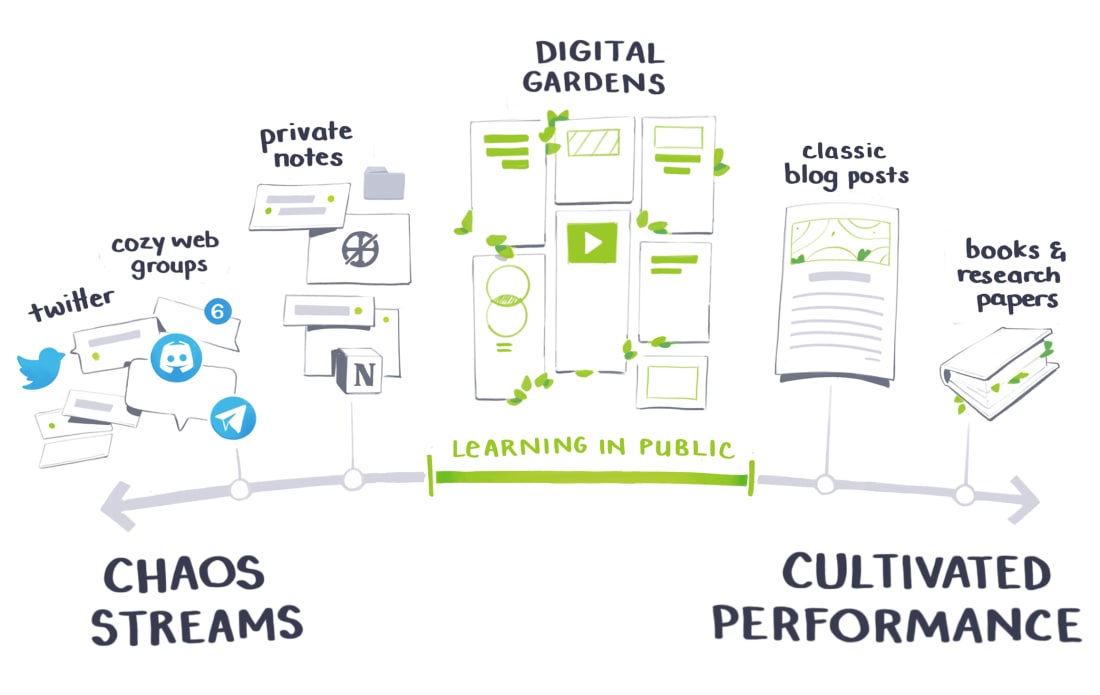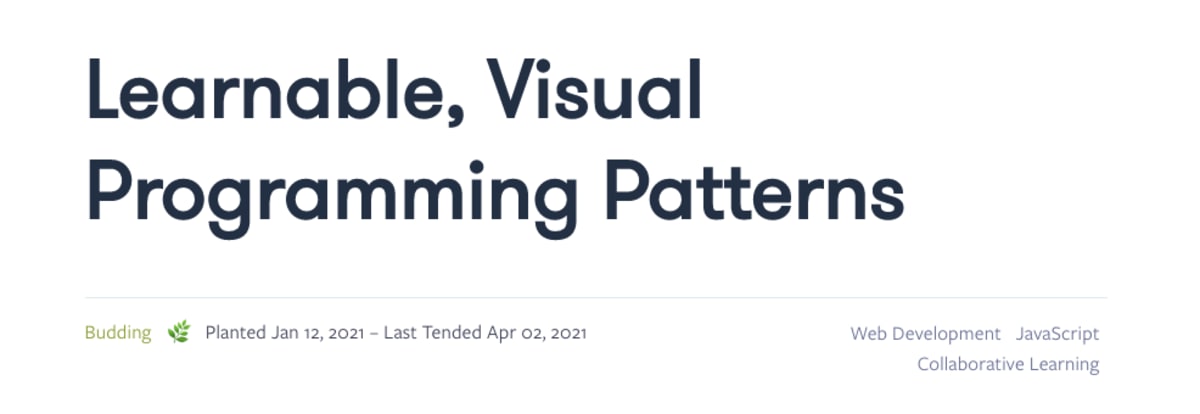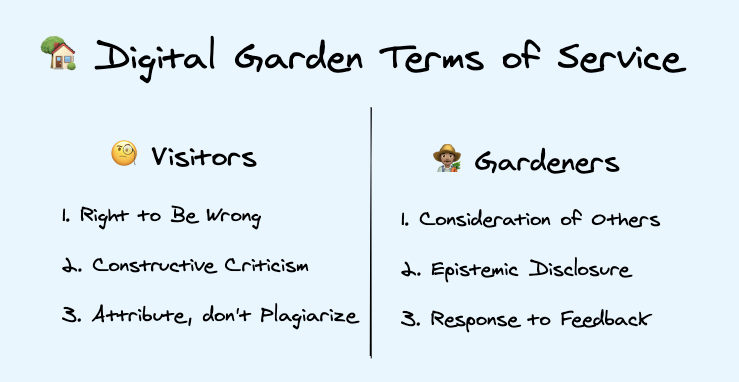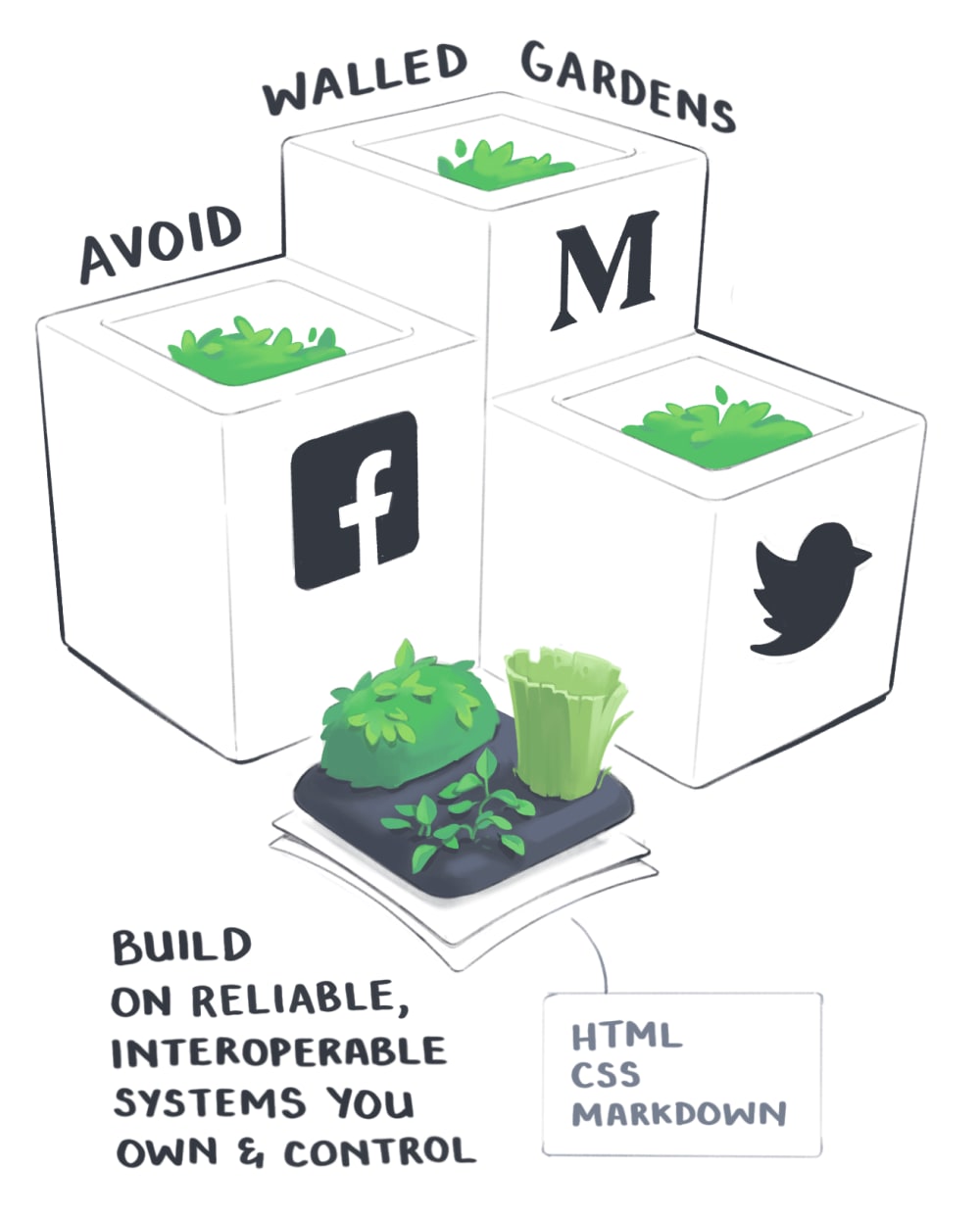# A Brief History & Ethos of the Digital Garden
! [ rw-book-cover] (https://maggieappleton.com/images/og/e8be85c4f66d83dd0e482b9862d461f2.png)
URL: https://maggieappleton.com/garden-history
Author: Maggie Appleton

## AI-Generated Summary
Digital gardening is a way of organizing and exploring evolving ideas online, moving away from strict chronological formats. It encourages personal knowledge accumulation in an open and creative environment, allowing for unique expressions and connections. This movement has gained traction through communities of developers and writers who are reimagining how we interact with information on the web.
## Highlights
> A garden is a collection of evolving ideas that aren't strictly organised by their publication date. ([View Highlight](https://read.readwise.io/read/01j6gqxwxbh7xgzc1s26p92d3x))
> They're inherently exploratory – notes are linked through contextual associations. They aren't refined or complete - notes are published as half-finished thoughts that will grow and evolve over time. ([View Highlight](https://read.readwise.io/read/01j6gqy7xtx042wpp83wt6wmsg))
#### A Brief History of Digital Gardens
> The early web-adopters were caught up in the idea of The Web as a labyrinth-esque community landscape tended by
> [WikiGardeners](https://wiki.c2.com/?WikiGardener)
> and
> [WikiGnomes.](https://wiki.c2.com/?WikiGnome) ([View Highlight](https://read.readwise.io/read/01j6gs85b8mek85p62t9b4c47e))
> [*The Navigation Problem*](https://link.springer.com/chapter/10.1007/978-3-642-55991-4_31)
> – the issue of how to give web users just enough guidance to freely explore the web, without forcing them into pre-defined browsing experiences. The eternal struggle to find the right balance of chaos and structure. ([View Highlight](https://read.readwise.io/read/01j6gsdv5xp3zqnj9ebcnwyek0))
> "Unplanned hypertext sprawl is wilderness: complex and interesting, but uninviting. Interesting things await us in the thickets, but we may be reluctant to plough through the brush, subject to thorns and mosquitoes" ([View Highlight](https://read.readwise.io/read/01j6gsdd2fenx8ym4ghsvy8sfn))
> After Mark's essay the term **digital gardening** goes quiet for nearly a decade. ([View Highlight](https://read.readwise.io/read/01j6gseb8hh4p4nr4kvdrpadre))
> Rory Sutherland (oddly, the vice president of Ogilvy Group) used the term "**digital gardening**", but defined it as *"faffing about syncing things, defragging - like pruning for young people"* ([View Highlight](https://read.readwise.io/read/01j6gsf291w9zqjrs0t53v8j2f))
> people were using the term as a way to describe **digital maintenance** - **the act of cleaning up one's digital space**. ([View Highlight](https://read.readwise.io/read/01j6gsg04ghjbfye4zgcay4285))
> The focus was on sorting, weeding, pruning, and decluttering, rather than growing and cultivating. ([View Highlight](https://read.readwise.io/read/01j6gsfjmc3dz4z1xp2mjkywt0))
> At the 2015 Digital Learning Research Network, Mike Caufield delivered a keynote on
> [The Garden and the Stream: a Technopastoral](https://www.youtube.com/watch?v=ckv_CjyKyZY&feature=emb_logo)
> . It later becomes
> [a hefty essay](https://hapgood.us/2015/10/17/the-garden-and-the-stream-a-technopastoral/)
> that lays the foundations for our current understanding of the term. ([View Highlight](https://read.readwise.io/read/01j6gshavbw12yxn11bq0p9emt))
> The *garden* is our counterbalance. **Gardens present information in a richly linked landscape that grows slowly over time.** Everything is arranged and connected in ways that allow you to explore. Think about the way Wikipedia works ([View Highlight](https://read.readwise.io/read/01j6gsq3cxb6qasx5e0dfdjecn))
> You get to actively choose which curiosity trail to follow, rather than defaulting to the algorithmically-filtered ephemeral stream. ([View Highlight](https://read.readwise.io/read/01j6gsqjwpvzf5hwwyah9ppsjg))
> The garden helps us move away from time-bound streams and into contextual knowledge spaces. ([View Highlight](https://read.readwise.io/read/01j6gsqp44y3vczck5s8pd8t9c))
##### Carrying on Caufield
> While gardens present the ideas of an individual, campfires are conversational spaces to exchange ideas that aren't yet fully formed. ([View Highlight](https://read.readwise.io/read/01j6gt6b52099sd7x5f2605rv7))
> Instead of hand-coding your own layout and deciding exactly how to arrange the digital furniture, we began to enter the age of standardised layouts. Plug n' play templates that you drop content into became the norm. ([View Highlight](https://read.readwise.io/read/01j6gt8n9fekr9xc92q7q13j3a))
> Shaun Wang compiled the
> [Digital Gardening Terms of Service](https://www.swyx.io/digital-garden-tos/)
> . ([View Highlight](https://read.readwise.io/read/01j6gt9wt00cpx42dhawx96qzq))
> Anne-Laure Le Cunff published a popular guide to setting up
> [No-code Digital Gardens](https://nesslabs.com/digital-garden-set-up)
> . ([View Highlight](https://read.readwise.io/read/01j6gta264wyfzgfrpgsdmzkfg))
> The IndieWeb community hosted a
> [pop-up session](https://indieweb.org/2020/Pop-ups/GardenAndStream)
> to discuss the history of commonplace books, personal wikis, and memory palaces. ([View Highlight](https://read.readwise.io/read/01j6gt9gg9jx4bqg3esdgjgwae))
##### Digital Gardening's Fertile Soil
> The
> [IndieWeb](https://indieweb.org/)
> collective – a group that has been championing independent web spaces outside the walled gardens of Instatwitbook for nearly a decade. ([View Highlight](https://read.readwise.io/read/01j6gtbz9z78f7p4rjc99yscw0))
> People rallying around the
> [Learn in Public](https://www.swyx.io/learn-in-public/)
> ethos that encourages continuously creating 'learning exhaust' in the form of notes and summaries. ([View Highlight](https://read.readwise.io/read/01j6gtbdkbe12909j4c31vfxh2))
> Services like
> [Netlify](https://www.netlify.com/)
> and
> [Vercel](https://vercel.com/)
> have taken the pain out of deployment. Static site generators like
> [Jekyll](https://jekyllrb.com/)
> ,
> [Gatsby](https://www.gatsbyjs.com/docs/)
> ,
> [11ty](https://www.11ty.dev/)
> and
> [Next](https://nextjs.org/)
> make it easier to build sophisticated websites that auto-generate pages, and take care of grunt work like optimising load time, images, and SEO. ([View Highlight](https://read.readwise.io/read/01j6gtjam3n20whzr0yvc63sgj))
> Tools like
> [Obsidian](https://obsidian.md/)
> ,
> [TiddlyWiki](https://tiddlywiki.com/)
> , and
> [Notion](https://www.notion.so/)
> are all great options. Many of them offer fancy features like nested folders,
> [Bi-Directional Links](https://maggieappleton.com/bidirectionals)
> , footnotes, and visual graphs. ([View Highlight](https://read.readwise.io/read/01j6gtjysc2ckmq9ppsagrctnh))
#### The Six Patterns of Gardening
##### 1. Topography over Timelines
> Gardens are organised around **contextual relationships and associative links**; the concepts and themes within each note determine how it's connected to others. ([View Highlight](https://read.readwise.io/read/01j6gtrmknp0bjefp074xc7rec))
> Gardens don't consider publication dates the most important detail of a piece of writing. Dates might be included on posts, but they aren't the structural basis of how you navigate around the garden. ([View Highlight](https://read.readwise.io/read/01j6gtsmzndk8ysdfh76jxthnn))
> Dense links are essential, but gardeners often layer on other ways of exploring their knowledge base. They might have
> [thematic piles](https://busterbenson.com/piles/)
> ,
> [nested folders](https://tomcritchlow.com/wiki/)
> , tags and filtering functionality,
> [advanced search bars](https://www.christopherbiscardi.com/garden)
> ,
> [visual node graphs](https://wiki.nikitavoloboev.xyz/)
> , or
> [central indexes](https://www.gwern.net/index)
> listing notable and popular content.
> Many entry points but no prescribed pathways. ([View Highlight](https://read.readwise.io/read/01j6gttnmh203dka1kxwstss1j))
##### 2. Continuous Growth
> Gardens are never finished, they're **constantly growing, evolving, and changing**. Just like a real soil, carrot, and cabbage garden. ([View Highlight](https://read.readwise.io/read/01j6gtvptyps4dhtcr6hbg12t7))
> Over the last decade, we've moved away from casual live journal entries and formalised our writing into *articles* and *essays*. These are carefully crafted, edited, revised, and published with a timestamp. When it's done, it's done. We act like tiny magazines, sending our writing off to the printer. ([View Highlight](https://read.readwise.io/read/01j6gtwebfzc9xkafggcthvkag))
> Gardens lean into this – there is no "final version” on a garden. What you publish is always open to revision and expansion. ([View Highlight](https://read.readwise.io/read/01j6gtwxea03xay3pax1s90j4f))
> You might notice a pattern in your corner of the world, but need to collect evidence, consider counter-arguments, spot similar trends, and research who else has thunk such thoughts before you. ([View Highlight](https://read.readwise.io/read/01j6gtxk738mxpw4bw9xskn5ed))
> In performance-blog-land you do that thinking and researching privately, then shove it out at the final moment. ([View Highlight](https://read.readwise.io/read/01j6gtybbv2hapy7gn8xa01mpv))
> You post ideas while they're still "seedlings,” and tend them regularly until they're fully grown, respectable opinions. ([View Highlight](https://read.readwise.io/read/01j6gtyva1xjvwdhfyqe72c648))
> It's *low friction*. Gardening your thoughts becomes a daily ritual that only takes a small amount of effort. Over time, big things grow. ([View Highlight](https://read.readwise.io/read/01j6gtzjg3m6ntzxbs8gh62dr0))
##### 3. Imperfection & Learning in Public

## New highlights added September 1, 2024 at 12:54 PM
> Gardens are **imperfect by design**. They don't hide their rough edges or claim to be a permanent source of truth. ([View Highlight](https://read.readwise.io/read/01j6ndqdg12rj1r2ebj9tx0gn7))
> We have all been trained to behave like tiny, performative corporations when it comes to presenting ourselves in digital space. Blogging evolved in the
> [Premium Mediocre](https://www.ribbonfarm.com/2017/08/17/the-premium-mediocre-life-of-maya-millennial/)
> culture of Millenialism as a way to Promote Your Personal Brand™ and market your SEO-optimized Content. ([View Highlight](https://read.readwise.io/read/01j6ndr0qrxec6pq4vrqp1ftwd))
> Digital gardening is the
> [Domestic Cozy](https://www.ribbonfarm.com/series/domestic-cozy/)
> response to the professional personal blog; it's both intimate and public, weird and welcoming. It's less performative than a blog, but more intentional and thoughtful than a Twitter feed. It wants to build personal knowledge over time, rather than engage in banter and quippy conversations. ([View Highlight](https://read.readwise.io/read/01j6ndsbs1fv40ntq2n56hhz12))
>  ([View Highlight](https://read.readwise.io/read/01j6ndtv62bk7k9g5v78mdqtsj))
> it enables you to
> [Learn in Public](https://www.swyx.io/learn-in-public/)
> ; the practice of sharing what you learn as you're learning it, not a decade later once you're an "expert.” ([View Highlight](https://read.readwise.io/read/01j6ndwx05j0jmgf46q2np870j))
> This could be with a simple categorisation system. I personally use an overly horticultural metaphor:
> • 🌱 *Seedlings* for very rough and early ideas
> • 🌿 *Budding* for work I've cleaned up and clarified
> • 🌳 *Evergreen* for work that is reasonably complete (though I still tend these over time). ([View Highlight](https://read.readwise.io/read/01j6ndxkj043s6w5bndqdf8kj9))
> I also include the dates I *planted* and *last tended* a post so people get a sense of how long I've been growing it.
>  ([View Highlight](https://read.readwise.io/read/01j6ne1ncdckazy8rrs8k7xdzd))
> [Gwern.net](https://www.gwern.net/index)
> was one of the earliest and most consistent gardeners to offer meta-reflections on their work. Each entry comes with:
> • topic tags
> • start and end date
> • a stage tag: *draft*, *in progress*, or *finished*
> • a certainty tag: *impossible*, *unlikely*, *certain*, etc.
> • 1-10 importance tag ([View Highlight](https://read.readwise.io/read/01j6ne3hbkfw01brvhj3f7k46j))
> Devon Zuegal is another notable gardener who has *epistemic status* and *epistemic effort* on their posts, indicating both their certainty level about the material, and how much effort went into making it. They also make a strong case for
> [lazy epistemic statuses](https://devonzuegel.com/post/epistemic-statuses-are-lazy-and-that-is-a-good-thing)
> as a feature, not a bug.
>  ([View Highlight](https://read.readwise.io/read/01j6ne4tmwbwxgs9pvzbg2anjn))
> In a similar vein, Shawn Wang has written the Digital Gardening
> [Terms of Service](https://www.swyx.io/digital-garden-tos)
> which I adore and ascribe to. ... 
> All of these design patterns feed our growing desire for transparency, meta information, and breadcrumbs back to the source of ideas.
> .
>  ([View Highlight](https://read.readwise.io/read/01j6ne73evb4w3kxhp1b0hmxaz))
##### 4. Playful, Personal, and Experimental
> Digital gardens should be just as unique and particular as their vegetative counterparts. The point of a garden is that it's a personal playspace. You organise the garden around the ideas and mediums that match your way of thinking, rather than off someone else's standardised template. ([View Highlight](https://read.readwise.io/read/01j6neb73b0dybj3t7xb1xpzrq))
> One goal of these hyper-personalised gardens is deep **contextualisation**. The overwhelming lesson of the Web 2.0 social media age is that dumping millions of people together into decontextualised social spaces is a shit show. ([View Highlight](https://read.readwise.io/read/01j6neaeengja8jpnjp35yvpyc))
##### 5. Intercropping & Content Diversity
> Gardens are not just a collection of interlinked words. While linear writing is an incredible medium that has served us well for a little over 5000 years, it is daft to pretend working in a single medium is a sufficient way to explore complex ideas. ([View Highlight](https://read.readwise.io/read/01j6necwem5fbm4wy8nq10fqz0))
> It is also absurd to ignore the fact we're living in an audio-visual cornucopia that the web makes possible. Podcasts, videos, diagrams, illustrations, interactive web animations, academic papers, tweets, rough sketches, and code snippets should all live and grow in the garden. ([View Highlight](https://read.readwise.io/read/01j6nechgdzssbhdn7rd6ywbxt))
> Historically, monocropping has been the quickest route to starvation, pests, and famine. Don't be a lumper potato farmer while everyone else is sustainably intercropping. ([View Highlight](https://read.readwise.io/read/01j6nedb1aqb1rjpwa1hwafrsw))
##### 6. Independent Ownership
> Gardening is about claiming a small patch of the web for yourself, one you fully own and control. ([View Highlight](https://read.readwise.io/read/01j6neg2a2ae1r3ve1bs7mgcpa))
> 
> Independently owning your garden helps you plan for long-term change. ([View Highlight](https://read.readwise.io/read/01j6nehzfaxy7q1zwdbwrens5q))
> Keeping your garden on the open web also sets you up to take part in the future of gardening. At the moment our gardens are rather solo affairs. We haven't figure out how to make them multi-player. ([View Highlight](https://read.readwise.io/read/01j6nek5m0kp77edceacvmnq67))